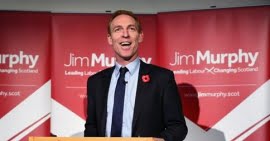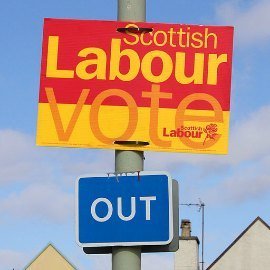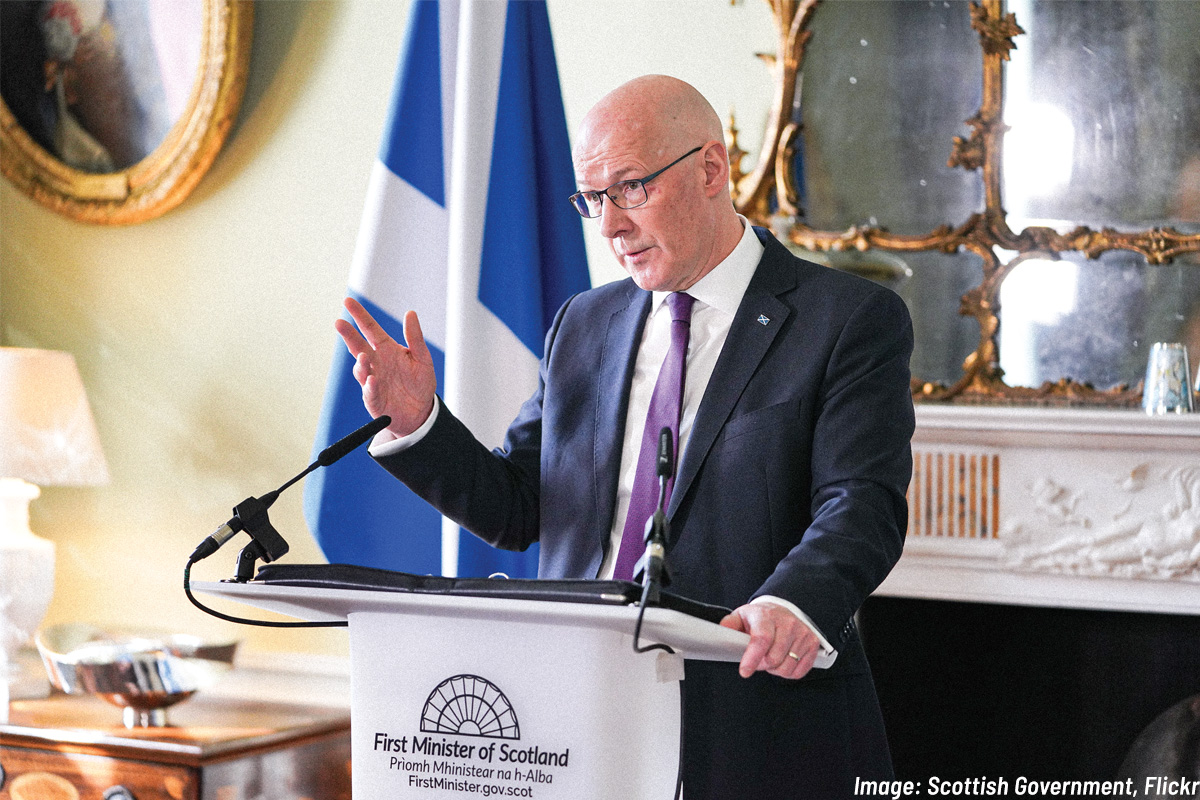As the general election approaches, polls indicate that Labour will be hit hard in Scotland, possibly being reduced to just a handful of seats. The rise of the SNP is posing an enormous headache to Labour, who will be unable to form a majority government without their support – and yet Miliband has, under Tory pressure, ruled out a coalition.
It has been a far from easy first few months in office for Scottish Labour Party leader, Jim Murphy. Since his election in December, having campaigned on the promise that his leadership would allow Labour to challenge the dominance of the SNP, Labour remain firmly slumped in second place. Polls are putting them on around 25%-30% of the popular vote compared to 40%-50% for the SNP and, even more worryingly (for Murphy and Labour), are predicting the SNP will win from 40-56 of the 59 Scottish seats. Such an outcome would represent a huge swing away from Labour, who currently hold 41 seats in Scotland, in comparison to the SNP’s 6.
Perhaps most distressing for Labour are Lord Ashcroft’s polls of 24 Scottish constituencies, including those with the largest Labour majorities from the 2010 election. Of these 24 constituencies, Ashcroft predicts 21 will return SNP MPs. These constituencies include: Gordon Brown’s seat in Kirkcaldy (which returned Brown with a 23,000 majority in 2010); six out of seven of Labour’s seats in Glasgow; Douglas Alexander’s seat in Paisley; and Alistair Darling’s Edinburgh South West constituency (Darling is standing down at this election). Even Murphy’s own seat in affluent East Renfrewshire hangs in the balance, with Ashcroft putting him just 1 percent point ahead of the SNP.
Political earthquake
 Amidst this seismic shift in Scottish politics, where Labour look set to dip below 35% of the Scottish vote for the first time in the post-war period, Jim Murphy and the rest of the Labour Party appear to have remarkably few answers.
Amidst this seismic shift in Scottish politics, where Labour look set to dip below 35% of the Scottish vote for the first time in the post-war period, Jim Murphy and the rest of the Labour Party appear to have remarkably few answers.
What the party seems to fail to understand is that the SNP is outflanking them to the left, with Nicola Sturgeon continually repeating that the party is anti-austerity and on the side of those being hit hardest by the cuts. This is what is leading to the massive swing.
Instead of responding with left-wing policy against the cuts and for the improvement of services (which could only be genuinely funded by nationalisation), Murphy introduced his own “Clause Four”, outlining the Scottish Labour Party’s commitment to “patriotism”.
Crisis of reformism
This response is the result of two things. The residual hold of New Labour over the party, and particularly over arch-Blairite Murphy, means that left policy continues to be shunned. The party remains keen to shows its commitment and responsibility to capitalism and the ruling class, a recipe that has led to disaster for social democratic parties elsewhere across Europe. In Greece, the social democrats, PASOK, a party was in government carrying out austerity, won less than 5% of the vote at the recent January election. Similarly, French president, Hollande, who came to power as the Socialist Party candidate, promising to raise taxes and prevent cuts, is now one of the least popular presidents ever as he has failed to deliver.
The other issue facing the Labour Party is that of the referendum. Once again this is something the leadership have failed to understand, and this is directly linked to Murphy’s blunt appeal to patriotism.
The political earthquake that was the Scottish independence referendum last year represented not a simple turn to nationalism but a vote for change and, fundamentally, a vote against austerity. In the weeks leading up to the referendum there was a huge swing behind the yes campaign, with one poll showing a majority in favour.
This can be directly related to the second televised debate in which Alex Salmond presented an independent Scotland as one which would offer social justice and fairness as opposed to the food banks of austerity Britain. Thousands of working class and young people swung behind independence as an opportunity to break with the austerity of Westminster and prevent there ever being a Tory government ruling Scotland again. They were fed up with the squeeze on living standards and wages of ordinary people while the rich keep getting richer. It was felt that things couldn’t get any worse and an independent Scotland could signal a change, a move away from the land of zero hours contracts, benefits sanctions and the bedroom tax. 37% of Labour voters voted yes, and it was old-Labour, working-class strongholds, such as Glasgow, Dundee, North Lanarkshire and West Dunbartonshire that voted Yes. The only age group where less than 40% voted Yes was the over 65s at 27% in comparison with 71% for 16-17 year olds.
In bed with the Tories
 Amidst this swing behind Yes, which occurred in spite of the ruling class’s vitriolic campaign, the Labour Party emerged as a hate figure. Having gotten into bed with the Liberal Democrats and Tories to form the Better Together campaign, and offering nothing more substantial than Union Jack waving and fear, thousands became even more disgusted with the party than they already were.
Amidst this swing behind Yes, which occurred in spite of the ruling class’s vitriolic campaign, the Labour Party emerged as a hate figure. Having gotten into bed with the Liberal Democrats and Tories to form the Better Together campaign, and offering nothing more substantial than Union Jack waving and fear, thousands became even more disgusted with the party than they already were.
Labour’s actions in the referendum should be contextualised within their policy and actions in the years leading up to it. This included their primary pledge of the 2011 Scottish election campaign primarily being the awe-inspiring slogan of “carry a knife, go to jail”, and former leader Johann Lamont speaking of the need to end Scotland’s “something for nothing” culture.
Whilst the Labour Party continually aligned themselves with the establishment the SNP, astutely, launched themselves as the anti-establishment and anti-austerity party, which would implement free university tuition fees and prescriptions in Scotland.
Hence we come to the situation today where the Scottish electorate is rejecting a Labour Party, which has relied on their votes but offered little to nothing in return, and instead turning towards the anti-austerity rhetoric of the SNP.
Headache for Labour
This is a massive headache for the Labour Party as we edge closer and closer to the general election. Scotland has usually represented a block of 40 seats for the party, but this looks set to be blown apart. Nationally, polls are showing little to no difference between the Labour and Tory vote, so we increasingly look set for a hung parliament with Labour as the biggest party (though perhaps not by much).
Considering the unpopularity of the Liberal Democrats after propping up the Tories over the past five years, it is unlikely they will have enough MPs to support a Labour government. Meanwhile the SNP are set to have over 40 seats.
This has led to much speculation in the media over whether or not the Labour Party will go into coalition with their bitter rivals. Speculation was heightened towards the end of last year when Sturgeon stated that the SNP would never prop up a Tory government, but could possibly come to a deal with Labour.
Coalition?
Over the past few weeks the right-wing of Labour have called on Miliband to rule out a coalition with the SNP, with some noises even being made around a grand coalition of Tory and Labour. On Monday 16th March, Miliband duly followed orders and announced that Labour would not go into coalition with the SNP and that there would be no SNP ministers in a Labour cabinet.
There are two key reasons for having done so. Firstly, and relating to the point made earlier about New Labour, the Labour Party remained fixated on respectability and responsibility to the capitalist system, something that would be threatened by involvement with the nationalists, who’s leaders pose the SNP as an anti-establishment and anti-austerity party.
Secondly it appears to be related to their own election strategy. It has been seen that a Labour-SNP coalition government would be favoured by the largest number of Scots. Labour are now attempting to take that option away and force a Labour vote by presenting Scottish voters with a choice between Labour and Tories, arguing that a vote for the SNP only improves the chances of a Tory government. Such cynical fear mongering tactics were clearly on show in Murphy’s appearance on Newsnight on Monday night.
This tactic seems unlikely to work. For one thing, the Labour Party is so widely discredited in Scotland that it would take a mammoth switch in policy to fundamentally swing the vote back their way, as voters are just too disgusted.
For another, as pointed out by Sturgeon in the same Newsnight episode, whilst a coalition has been ruled out, this doesn’t prevent a “supply-and-confidence” agreement on a vote-by-vote basis. Astutely Sturgeon also pointed out that her party had never sought a coalition with Labour and that they would not vote for Labour policy to continue with £7 billion of cuts (or any cuts at all) or increasing funding for trident. Such right-wing, pro-austerity policies would therefore rely on Tory votes, only further increasing the image of the Labour leadership being in bed with the Tories.
SNP and austerity
 Labour will argue that the nationalists’ anti-austerity rhetoric is disingenuous, and this is undoubtedly true. The SNP are fundamentally a party built on petty-bourgeois and big business principles. Whilst they have intelligently presented an anti-austerity image, they have also recently overseen the continued privatisation of ScotRail; their vision for independence included a cut in corporation tax; and the continuation of free higher education has been at the expense of the quality of further education, with colleges in Scotland having experienced huge cuts.
Labour will argue that the nationalists’ anti-austerity rhetoric is disingenuous, and this is undoubtedly true. The SNP are fundamentally a party built on petty-bourgeois and big business principles. Whilst they have intelligently presented an anti-austerity image, they have also recently overseen the continued privatisation of ScotRail; their vision for independence included a cut in corporation tax; and the continuation of free higher education has been at the expense of the quality of further education, with colleges in Scotland having experienced huge cuts.
The Labour leadership, however, have only got themselves to blame for the situation they find themselves in north of the border. They have peddled a line of Tory-lite policy that offers little to working class people, and have pledged themselves to the establishment, failing to offer any alternative to Tory austerity or Union Jack waving.
Fight for change! Fight for socialism!
Whatever the outcome of the next election, the stage is set for class struggle. As long as the next government remains committed to capitalism they will be committing themselves to further austerity and cuts in the living standards of working people.
The referendum in Scotland showed the frustration that exists in society, and this extends across the UK. Provocative austerity and cuts will not be pushed through with a response. Youth and workers will look for a way out and will seek a fundamental change. Such change is vital and can only be achieved through fighting for socialism.
There is plenty of money in the system. In order to provide needed services and share it equally we must nationalise the heights of the economy and bring them into workers’ control. This would mean the economy could be ran for the needs of the masses, not the profits of the few. This is the only way in which the demands of those seeking change, such as those who voted Yes in last year’s referendum, can be met in reality – by fighting for the socialist transformation of society, in Scotland, in Britain, and internationally.






